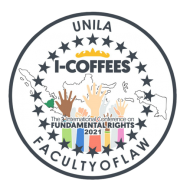[wpcdt-countdown id=”827″]
About Us
INTRODUCTION
The COVID-19 pandemic is a global phenomenon that has hit almost all countries. Not only affecting the health sector, other sectors are also forced to adapt to this global health crisis, including the growth of digital transformation and its legal challenges. Much of the world was moving online and accelerating a digital transformation. Children with internet access at home started to join the class remotely. Many employees have started working from home. Many companies adopted a digital business model to maintain revenue flows. Meanwhile, mobile applications have been developed to help track and trace the progress of a pandemic. Researchers used artificial intelligence (AI) to learn more about viruses and speed up searches for the vaccine. In some countries, internet traffic increased by up to 60% shortly after the outbreak (OECD, 2020a).
Digital transformation is a “two-edged sword” since it can have both beneficial and negative consequences. According to the UN report (2020), digital transformation can increase productivity, encourage connectivity, create financial inclusion, and provide wider access to trade activities and public services. Technology is the basis of digital transformation and plays an important role in supporting the creation of equal opportunity and justice, including through the development of the digital economy for micro, small and medium enterprises (UNCTAD, 2019). On the other hand, digital transformation can also present negative impacts or quite complex challenges, such as computer related crime, privacy data, employee pushback, structural-organizational changes, and intellectual property infringement (OECD, 2019). The negative impact of digital transformation is also quite serious on children and youth (UNICEF, 2017).
Digital transformation is essential in facilitating collaboration and promoting evidence-based policy, considering that epidemiologists, medical and public health specialists, and others require data integration to address various health issues, including COVID-19 mass vaccination policy. Pandemic has been a driving force behind e-health, telemedicine, e-payments, computerized patient records, and other related technologies. Earlier investments into digital transformation by authorities are helping in navigating the crisis and ensure the delivery of essential healthcare services. There have been some attempts to automate health-care services, for example, an app for contact tracing can be developed and deployed, or a bot application can be launched on Telegram to help spread information about COVID-19 and assist people in finding assistance.
While digital transformation has some advantages, the quick rate of its growth and absence of regulation raises concerns about fundamental rights. The rising poverty rate in the post-pandemic era is putting socio-economic resilience and the enforcement of fundamental rights to economic, social, and cultural (ecosoc) rights under strain. Poverty has the potential to impede access to high quality healthcare facilities, as well as to reduce productivity due to poor health. The increasing number of unemployed individuals caused by the pandemic is one of the issues that has led to the poverty rate and the slowing of economic growth. The pandemic has reduced about 255 million jobs in developing countries in 2020 (ILO, 2020). Furthermore, the weakening of the global economy has posed a threat to food access. The World Food Program (WFP) estimates that there are 272 million people who are already or are at risk of being food insecure (World Bank, 2021). Other aspects of the COVID-19 pandemic’s impact that must be highlighted are socioeconomic inequities, particularly in public health care, and inadequate governance systems, both of which have contributed to the rising trend in COVID-19 cases.
A fundamental rights-based strategy to address the epidemic recovery must be constantly advocated. This includes, for example, defending everyone’s right to life and right to health without discrimination, paying attention to the rights of the most vulnerable, balancing rights when adopting restrictive measures, and employing emergency legislation and measures in accordance with the standards and guarantees of fundamental rights. This rapidly changing condition has become a challenge as well as a new opportunity for the country to review how the road map and the role of the law in the post-pandemic recovery should be implemented. Effective law may avoid a free fall of an unmanaged crisis that would be costly. The role of the government, supported by the private sector and of course the community, is very important in responding to the challenge of adjusting law that pays more attention to digital transformation and, at the same time, recovers the impact of the pandemic today. As a result, a full formulation of solutions relevant to the post-COVID-19 pandemic recovery is required, as well as the identification of items that have not been accommodated and deliver unique keys that may be proposed from this conference. This is the 4th International Conference on Fundamental Rights (I-Coffees) with the theme “Digital Transformation in Post COVID-19 Recovery: Ensuring Technology Serve for the Fundamental Rights.”
PURPOSE
- Generate various ideas and thoughts related to Legal Issues in Post Covid-19 Recovery.
- As a forum for practitioners, researchers and academics from various countries of the world to exchange ideas and opinions regarding Legal Issues in Post Covid-19 Recovery.
- Produce quality articles from various practitioners, researchers and academics from around the world.
The 4th I-Coffees (Times and Venue)
Date : October 3-4, 2022
Venue : Swiss-Belhotel Bandar Lampung, Jl. Rasuna Said No.18, Bandar Lampung, Indonesia 35214 (Offline) and Zoom (Online)
Call For Papers
We are pleased to invite applications from international. national, and local researchers, academic scientics, practitioners, and students as presenter as well as participant.
Keynote Speakers
Jalil Alejandro Magaldi Serna, Legal Researcher at Universidad Externado de Colombia. Dr. Fakih, S.H., M.S., Dean of Faculty of Law at Universitas Lampung Dr. Edmon Makarim, S.H., S.Kom., L.L.M., Dean of Faculty of Law at Universitas Indonesia Andrea Boggio, Bryant University. Osman Devrim Elvan*, Istanbul University- Cerrahpasa. CHOONG Yeow Choy*, University of Malaya. Ana Isabel …
Countdown Timer
[wpcdt-countdown id=”827″]

